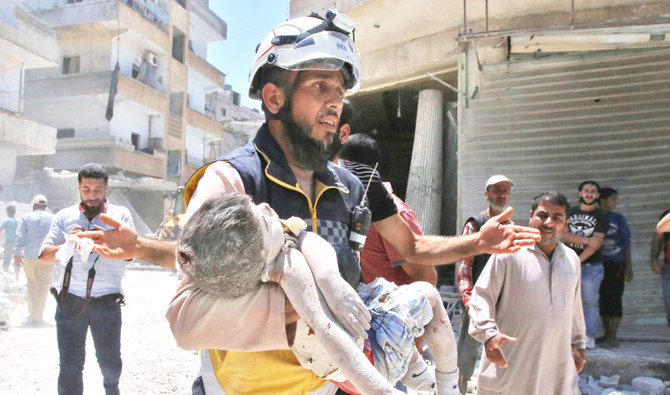BEIRUT: For three months Damascus and its ally Russia have been pummeling hospitals, markets and schools in Idlib unleashing a deadly, ferocious campaign aimed at retaking Syria’s last opposition-run stronghold, analysts say.
Opponents to the regime of Bashar Assad have denounced what they say call a bid to “exterminate” the region, while the UN has condemned the world’s “collective shrug” at the mounting casualties, many of them women and children.
Located in northwest Syria, Idlib as well as parts of the neighboring provinces of Aleppo, Hama and Latakia remain under the control of an opposition alliance Hayat Tahrir Al-Sham.
The aim of the air raids is to “put pressure on the factions and their popular base,” said Nawar Oliver, an analyst at the Turkey-based Omran Center.
It is also a prelude to retaking the region — where “all the Syrian opposition and the families of fighters are based” — a move “temporarily delayed” by a September truce deal between Syria, Russia and Turkey.
It’s a “terrifying war of attrition with civilians, health institutions and other infrastructure all being targeted,” said Oliver.
The region is now home to about 3 million people, most of whom have been displaced from other areas during Syria’s grueling war, now in its ninth year, which has so far claimed some 370,000 lives.
Launched in late April, the campaign has yet to secure major regime gains. But it aims to sap morale and erode support for those running Idlib, analysts said.
The airstrikes have claimed more than 740 lives since late April, according to the Britain-based Syrian Observatory for Human Rights.
The UN says more than 400,000 people have been displaced.
Idlib was meant to be protected from any regime assault by the September 2018 buffer zone deal, signed by Russia and opposition backer Turkey.
But the UN’s humanitarian coordination office OCHA has documented 39 attacks against health facilities or medical workers in the area in three months.
At least 50 schools have been damaged by the airstrikes and shelling over the same period, it reported.
“These are civilian objects, and it seems highly unlikely, given the persistent pattern of such attacks, that they are all being hit by accident,” UN rights chief Michelle Bachelet said on Friday.
HIGHLIGHTS
Both Damascus and Moscow are presenting Idlib as the ‘final battle; the last terrorist holdout,’ seeking to lend legitimacy to the bombing campaign.
She condemned “international indifference” over a mounting civilian death toll, adding she was concerned the continued carnage in Syria “is no longer on the international radar.”
“Airstrikes kill and maim significant numbers of civilians several times a week, and the response seems to be a collective shrug,” she said. Regime air raids have mostly targeted southern Idlib as well as nearby territory in northern Hama, where clashes between Syrian regime forces and opposition have emptied entire villages of their inhabitants.
“Russia is now pushing more concertedly than ever for a complete reintegration of Syria under Assad’s rule,” said Samuel Ramani, a Syria researcher.
Both Damascus and Moscow are presenting Idlib as the “final battle — the last terrorist holdout,” seeking to lend legitimacy to the bombing campaign, Oliver said.
Damascus commands around 60 percent of the country, with the Idlib region and Kurdish-held territory in Syria’s northeast both remaining outside its control.
Analysts attribute the regime’s failure to advance deeper into Idlib to efforts by opposition backer Turkey, which has deployed forces in northwest Syria in agreement with Russia and Iran.
Ankara’s military assistance to opposition, including “logistical cooperation through observation points, as well as direct arms and munitions transfers” is impeding Assad’s progress, Ramani said.
Moscow wants Turkey to cease such support, but whether Ankara will compromise is unclear, the expert said.
Instead, “it seems as if Ankara is supporting the rebels (opposition) with greater enthusiasm than it has in a long time,” Ramani added.
Turkey, which hosts around 3.5 million Syrians, fears an all-out regime assault on Idlib will trigger a massive wave of displacement toward its southern border.
Thousands of Syrians have already streamed into camps and open-air settlements near the frontier in recent weeks to escape bombardment.






















